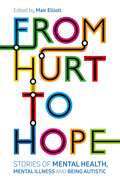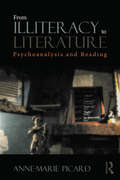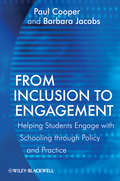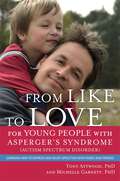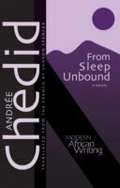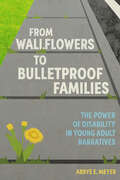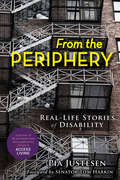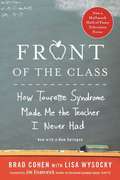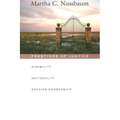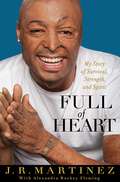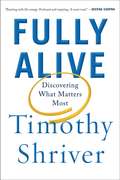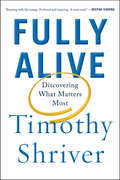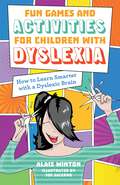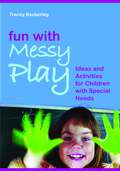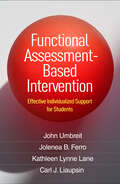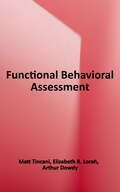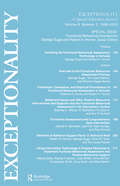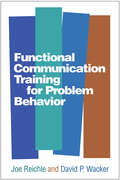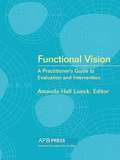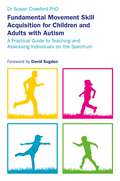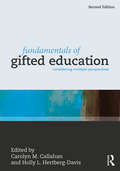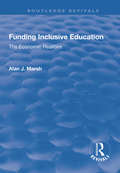- Table View
- List View
From Homer to Helen Keller: A Social and Educational Study of the Blind
by Richard Slayton French<P>From Homer to Helen Keller, Homer stands for the greatest achievement of the blind in the times antecedent to their systematic education. He stands for all those bards, many of them blind or blinded, creators of literature and makers of our language, who through ballads, always of great vigor and sometimes of surpassing beauty, have handed down to us the glorious traditions of far-off heroic times. <P>Miss Keller stands for the supreme achievement of education. The blind claim her, but the deaf can claim her, too, and modern education can claim her more than either--and all humanity claims her with the best claim of all. For she is the epitome of all that is best in humanity, all that is most spiritual; and all this through conscious aim and directed effort, through education in its best sense.
From Hurt to Hope: Stories of mental health, mental illness and being autistic
by Paul Statham Jessica White Yenn Purkis Morénike Giwa Onaiwu Suzy Rowland Emma Cobb Emma Wishart Robert Joyce Casey Chonily Nura AabeAlmost 80% of autistic people have a co-occurring mental health condition, and this powerful book puts their voices front and centre, showcasing the human experience beyond the medicalised language and diagnoses. This poignant essay collection shines a light on voices that often go unheard in our society. Covering a range of experiences from multiple ages, genders and backgrounds, discussions include trauma, relationships, masking, healthcare, intersectionality and more.The essays are structured along the topics of hurt (personal experiences and how they shaped the contributor), help (the tools and tips which have helped on their personal journeys), and hope (looking forward to the future). At times touching, humorous, and also enraging, this book offers a frank and honest depiction of the challenges autistic people face and the knock-on effect on their mental health. A challenge to change how our society treats and values one another.
From Illiteracy to Literature: Psychoanalysis and Reading
by Anne-Marie PicardFrom Illiteracy to Literature presents innovative material based on research with ‘non-reading’ children and re-examines the complex relationship between psychoanalysis and literature, through the lens of the psychical significance of reading: the forgotten adventure of our coming to reading. Anne-Marie Picard draws on two specific fields of interest: firstly the wish to understand the nature of literariness or the "literary effect", i.e. the pleasures (and frustrations) we derive from reading; secondly research on reading pathologies carried out at St Anne’s Hospital, Paris. The author uses clinical observations of non-reading children to answer literary questions about the reading experience, using psychoanalytic theory as a conceptual framework. The notion that reading difficulties or phobias should be seen as a symptom in the psychoanalytic sense, allows Picard to shed light on both clinical vignettes taken from children’s case histories and reading scenes from literary texts. Children experiencing difficulties in learning to read highlight the imaginary stakes of the confrontation with the arbitrary nature of the letter and the "price to pay" for one’s entrance into the Symbolic. Picard applies the lesson "taught" by these children to a series of key literary texts featuring, at their very core, this confrontation with the signifier, with the written code itself.. This book argues that there is something in literature that drives us back, again and again, to the loss we have suffered as human beings, to what we had to undergo to become human: our subjection to the common place of language. Picard shows complex Lacanian concepts "at work" in the field of reading pathologies, emphasizing close reading and a clinical attention to the "letter" of the texts, far from the "psychobiographical" attempts at psychologizing literary authors. From Illiteracy to Literature presents a novel psychodynamic approach that will be of great interest to psychotherapists and language pathologists, appealing to literary scholars and those interested in the process of reading and "literariness."
From Inclusion to Engagement
by Paul Cooper Barbara JacobsFrom Inclusion to Engagement challenges the ideologically driven academic discourse that has come to dominate inclusive education by presenting research-based knowledge about what actually works.Presents an innovative approach rooted in a biopsychosocial theoretical perspective - an approach that is still relatively misunderstood within the educational sphereOffers insights based on an extensive review of contemporary international research in the fieldAvoids the biases of ideology in favour of science-based social and educational outcomesThe first comprehensive account of evidence-based interventions for students with Social, Emotional and Behavioural Difficulties
From Like to Love for Young People with Asperger's Syndrome (Autism Spectrum Disorder): Learning How to Express and Enjoy Affection with Family and Friends
by Tony Attwood Michelle GarnettIf your child rarely shows you that he or she loves you, it can be profoundly distressing. This is the experience of many parents of children with an autism spectrum disorder (ASD), and most fear that it reflects the truth. In fact the truth has generally more to do with the difficulty that young people with an ASD have in communicating like or love for someone physically and verbally. They may not know how to go about expressing themselves in these ways, or understand that family members and friends can find the absence of demonstrative affection upsetting. This book, by world leading experts Tony Attwood and Michelle Garnett, addresses this issue in practical terms. They provide carefully designed activities for parents to work through with their children to help them to understand and express affection. Their child will learn to identify his or her own and others' comfort and enjoyment range for gestures, actions and words of affection and the different ways to express feelings for someone, appropriate to each relationship and situation. The activities are simple, straightforward, and very carefully structured, so that they can be undertaken at the pace that works for the individual family. The book also guides the adult through the challenges faced by the child, leading to greater understanding and confidence in their relationship with their child, and increased ability to nurture the child's ability to form engaged relationships and friendships with others. Readers of Tony Attwood's previous books will recognise his warm, positive and empowering approach. The book will be a transformative resource for parents and family worried about their child's emotional life.
From Pixels to Purpose: Exploring Digital Inclusion and Personal Growth
by Jalasa SapkotaJalasa Sapkota's book presents a compelling fusion of two interconnected themes: digital inclusion and personal fulfillment. The initial section delves into the pressing need for digital accessibility, highlighting challenges faced by individuals with disabilities in navigating online environments. Through insightful articles, Sapkota calls for a more equitable digital future, scrutinizing both institutional commitments and pragmatic realities. The subsequent part shifts focus to a deeply personal exploration of self-discovery and relationships. Through provocative narratives, Sapkota unravels the intricacies of women's desires, happiness, and understanding relationships, prompting readers to reflect on their own experiences and connections. This book serves as an invaluable resource, offering diverse perspectives on disability rights, digital inclusion, and the journey toward personal fulfillment. Whether you're an advocate, a seeker of personal growth, or a curious reader, Sapkota's work promises to inspire, provoke, and enlighten, providing profound insights into the essence of inclusion, selfhood, and the human condition.
From Sleep Unbound
by Andrée Chedid Sharon SpencerFrom Sleep Unbound takes its readers directly into the heart of the woman's world. Samya is the product of a contemporary middle-Eastern upbringing with its harsh and brutal customs, particularly concerning women, whose earthly existences serve certain specific purposes: to serve man and to bear children. Her husband, unfeeling, detached, uninterested, does not even notice the beauty which radiates from her face: large brown eyes, smooth olive skin, jet black hair, slim features. Daily, Samya feels her life eroding, slowly crumbling, slipping, dematerializing into oblivion. Sensations of uselessness reduce her to a state of psychological penury, of fragmentation. Then, anger and resentment, even hatred intrude, resulting perhaps out of sheer dismay at her own passivity. Her sister-in-law, Rachida, whom her husband depends upon so implicitly and explicitly to run the cotton farm, arrives. Rancor swells. Jealousy. As Samya pursues her story, defoliating her feelings, exposing her fulgurating pain like a raw nerve, images are marked with burnt umber, gray, black, darkened configurations. The atmosphere is suffused with feelings swelling with rapture and sensuality, also with bouts of rage and outrage.
From Wallflowers to Bulletproof Families: The Power of Disability in Young Adult Narratives (Children's Literature Association Series)
by Abbye E. MeyerUses of disability in literature are often problematic and harmful to disabled people. This is also true, of course, in children’s and young adult literature, but interestingly, when disability is paired and confused with adolescence in narratives, compelling, complex arcs often arise. In From Wallflowers to Bulletproof Families: The Power of Disability in Young Adult Narratives, author Abbye E. Meyer examines different ways authors use and portray disability in literature. She demonstrates how narratives about and for young adults differ from the norm. With a distinctive young adult voice based in disability, these narratives allow for readings that conflate and complicate both adolescence and disability. Throughout, Meyer examines common representations of disability and more importantly, the ways that young adult narratives expose these tropes and explicitly challenge harmful messages they might otherwise reinforce. She illustrates how two-dimensional characters allow literary metaphors to work, while forcing texts to ignore reality and reinforce the assumption that disability is a problem to be fixed. She sifts the freak characters, often marked as disabled, and she reclaims the derided genre of problem novels arguing they empower disabled characters and introduce the goals of disability-rights movements. The analysis offered expands to include narratives in other media: nonfiction essays and memoirs, songs, television series, films, and digital narratives. These contemporary works, affected by digital media, combine elements of literary criticism, narrative expression, disability theory, and political activism to create and represent the solidarity of family-like communities.
From the Periphery: Real-Life Stories of Disability
by Pia Justesen Tom HarkinFrom the Periphery consists of more than 30 first-person narratives of everyday people who describe what it's like to be treated differently by society because of their disabilities. The stories are raw and painful, but also surprisingly funny and deeply inspiring. The oral histories describe anger, independence, bigotry, solidarity and love—in the family, at school and at the workplace. Inspired by the oral historians Studs Terkel and Svetlana Alexievich, From the Periphery will become a classic oral history collection that will increase the understanding of the lived experiences of people with disabilities, their responses to oppression and their coping strategies. Readers will meet Andre, who felt different as a child because she was blind. Her father insisted that she could ride a bike, but neighborhood kids would still ask, "Can I catch what you have?" Marca Bristo acquired her disability after a diving accident and became invisible as a person. Men would only see her wheelchair and she started doubting her sexuality. Curtis Harris was treated like a piece of meat in school. He has come to accept autism as part of his personality: "You are who you are. . . . You reject normalism."
Front of the Class: How Tourette Syndrome Made Me the Teacher I Never Had
by Brad Cohen Lisa WysockyAs a child with Tourette syndrome, Brad Cohen was ridiculed, beaten, mocked, and shunned. Children, teachers, and even family members found it difficult to be around him. As a teen, he was viewed by many as purposefully misbehaving, even though he had little power over the twitches and noises he produced, especially under stress. Even today, Brad is sometimes ejected from movie theaters and restaurants. But Brad Cohen's story is not one of self-pity. His unwavering determination and fiercely positive attitude conquered the difficulties he faced in school, in college, and while job hunting. Brad never stopped striving, and after twenty-four interviews, he landed his dream job: teaching grade school and nurturing all of his students as a positive, encouraging role model.
Frontiers of Justice: Disability, Nationality, Species Membership
by Martha C. Nussbaumgeneral and the timeless. Yet such theories, addressing the world and its problems, must respond to the real and changing dilemmas of the day. A brilliant work of practical philosophy, Frontiers of Justice is dedicated to this proposition. Taking up three urgent problems of social justice neglected by current theories and thus harder to tackle in practical terms and everyday life, Martha Nussbaum seeks a theory of social justice that can guide us to a richer, more responsive approach to social cooperation.<P><P> The idea of the social contract--especially as developed in the work of John Rawls--is one of the most powerful approaches to social justice in the Western tradition. But as Nussbaum demonstrates, even Rawls's theory, suggesting a contract for mutual advantage among approximate equals, cannot address questions of social justice posed by unequal parties. How, for instance, can we extend the equal rights of citizenship--education, health care, political rights and liberties--to those with physical and mental disabilities? How can we extend justice and dignified life conditions to all citizens of the world? And how, finally, can we bring our treatment of nonhuman animals into our notions of social justice? Exploring the limitations of the social contract in these three areas, Nussbaum devises an alternative theory based on the idea of "capabilities." She helps us to think more clearly about the purposes of political cooperation and the nature of political principles--and to look to a future of greater justice for all.
Full of Heart: My Story of Survival, Strength, and Spirit
by J. R. Martinez Alexandra Rockey FlemingAn inspirational journey from tragedy to triumph In 2003, nineteen-year-old Private J. R. Martinez was on a routine patrol when the Humvee he was driving hit an antitank mine in Iraq, resulting in severe injuries and burns on his face and more than one-third of his body. Out of that tragedy came an improbable journey of inspiration, motivation, and dreams come true. In Full of Heart, Martinez shares his story in intimate detail, from his upbringing in the American South and his time in the Army to his recovery and the indomitable spirit that has made him an inspiration to countless fans. J. R. Martinez always had a strong spirit. Raised in Bossier City, Louisiana, and then Hope, Arkansas, by a single mother from El Salvador, he was well known at school for his good looks and his smart mouth. At seventeen, showing an early determination and drive that would become one of his trademark qualities, J. R. convinced his mom to move to Dalton, Georgia, where he believed he would have a better chance of being recruited to play college football. His positive attitude earned him a spot on a competitive high school football squad, but when his college dreams collapsed, he turned to the U. S. Army. A few months later, he found himself serving in Iraq. When J. R. 's humvee hit a mine and exploded--just one month into his deployment--he was immediately evacuated to a San Antonio medical center, where he spent the next thirty-four months in grueling recovery. Seeing his disfigured face for the first time after the accident threw him into a crushing period of confusion and anger. His spirits were low, until he was asked to speak to another young burn victim. J. R. realized how valuable and gratifying it was to share his experiences with other patients and listen to theirs. He'd found a calling. His fellow soldiers, along with the local and then national media, soon latched onto J. R. 's spirit and strength. His resilience, optimism, and charm were also noted by Hollywood and scored him roles on All My Children and Dancing with the Stars, where he was the season thirteen champion. Today, J. R. tours the country sharing his story and his lessons for overcoming challenges and embracing hope, lessons that abound in this book. Full of Heart is an unforgettable story of a man who never gave up on his dreams. After being injured in Iraq, J. R. Martinez became a motivational speaker, actor, and winner of season thirteen of Dancing with the Stars. Martinez lives in Los Angeles
Fully Alive: Discovering What Matters Most
by Timothy ShriverOn a quest for what matters most, Timothy Shriver discovers a radically different, inspiring way of life. At a time when we are all more rudderless than ever, we look for the very best teachers and mentors to guide us. In Fully Alive, an unusual and gripping memoir, Timothy Shriver shows how his teachers have been the world's most forgotten minority: people with intellectual disabilities. In these pages we meet the individuals who helped him come of age and find a deeper and more meaningful way to see the world. Shriver's journey begins close to home, where the quiet legacy of his aunt Rosemary, a Kennedy whose intellectual disability kept her far from the limelight, inspired his family to devote their careers to helping the most vulnerable. He plays alongside the children of Camp Shriver, his mother's revolutionary project, which provided a space for children with intellectual disabilities to play, and years later he gains invaluable wisdom from the incredible athletes he befriends as chairman of the organization it inspired, Special Olympics. Through these experiences and encounters with scholars, spiritual masters, and political icons such as Nelson Mandela, Shriver learns how to find humility and speak openly of vulnerability and faith. Fully Alive is both a moving personal journey and a meditation on some of the greatest wisdom and the greatest contradictions of our society. Is disability to be feared or welcomed, pitied or purged? Shriver argues that we all have different abilities and challenges we should embrace. Here we see how those who appear powerless have turned this seeming shortcoming into a power of their own, and we learn that we are all totally vulnerable and valuable at the same time.
Fully Alive: Discovering What Matters Most
by Timothy ShriverOn a quest for what matters most, Timothy Shriver discovers a radically different, inspiring way of life.At a time when we are all more rudderless than ever, we look for the very best teachers and mentors to guide us. In Fully Alive, an unusual and gripping memoir, Timothy Shriver shows how his teachers have been the world's most forgotten minority: people with intellectual disabilities. In these pages we meet the individuals who helped him come of age and find a deeper and more meaningful way to see the world.Shriver's journey begins close to home, where the quiet legacy of his aunt Rosemary, a Kennedy whose intellectual disability kept her far from the limelight, inspired his family to devote their careers to helping the most vulnerable. He plays alongside the children of Camp Shriver, his mother's revolutionary project, which provided a space for children with intellectual disabilities to play, and years later he gains invaluable wisdom from the incredible athletes he befriends as chairman of the organization it inspired, Special Olympics. Through these experiences and encounters with scholars, spiritual masters, and political icons such as Nelson Mandela, Shriver learns how to find humility and speak openly of vulnerability and faith.Fully Alive is both a moving personal journey and a meditation on some of the greatest wisdom and the greatest contradictions of our society. Is disability to be feared or welcomed, pitied or purged? Shriver argues that we all have different abilities and challenges we should embrace. Here we see how those who appear powerless have turned this seeming shortcoming into a power of their own, and we learn that we are all totally vulnerable and valuable at the same time.
Fun Games and Activities for Children with Dyslexia: How to Learn Smarter with a Dyslexic Brain
by Alais Winton Joe SalernoDyslexic learner and teacher Alais Winton shows the positives of being dyslexic, and makes learning (and even spelling!) fun, with games and activities to make school learning simple. An inventive and practical book for children aged 7 to 13 who have been identified as having dyslexic tendencies, this book contains practical and creative activities for kids and teens to use, such as Spelling Sculptures and Hear it, Sing it, Beat it! The games and activities use the four different learning styles that work best with dyslexics - thinking in pictures, in movement, in music or socially. With funny cartoons, which appeal to visual thinkers, and a section with advice on how parents and guardians can aid learning, this is an essential toolkit for any dyslexic child.
Fun with Messy Play: Ideas and Activities for Children with Special Needs
by Tracy BeckerlegFunny smells, sticky hands and squishy textures are all part of the way in which children develop sensory awareness. Fun with Messy Play is an exciting activity book that heightens the sensory perception of children with special needs through the imaginative use of everyday `messy' materials like baked beans, condensed milk, jelly or glue. The activities in this book are fun for children and help to improve their co-ordination, communicative and cognitive abilities, as well as their self-esteem and social skills. Each exercise focuses the child on a movement or sensation that they will later be able to apply to everyday life. By allowing children to explore their senses while having fun, messy play provides a relaxing therapy that encourages sensory responsiveness without placing stressful expectations on the child. This is an easy-to-use, practical resource for parents and professionals. It includes ideas and examples from practitioners along with helpful suggestions for different types of equipment that can be used.
Functional Assessment-Based Intervention: Effective Individualized Support for Students
by Kathleen Lynne Lane John Umbreit Jolenea B. Ferro Carl J. LiaupsinFrom noted authorities, this book presents a comprehensive approach to designing and implementing evidence-based Tier 3 behavior interventions for K–12 students. The authors' functional assessment-based intervention (FABI) process has been supported by multiple peer-reviewed studies conducted in authentic educational environments. Step by step, chapters spell out proven methods to define target behaviors, determine the function of the undesirable behavior, identify appropriate replacement behaviors, and deliver and monitor intensive interventions. Illustrated with real-world case examples, the book shows how to embed FABI within a school's integrated tiered system of supports. Guidance for scaling FABI district- and statewide is also provided. Ethical issues, professional standards, equity concerns, and cultural and linguistic considerations are addressed throughout. In a convenient large-size format, the book includes reproducible checklists and forms that can also be downloaded for ease of use.
Functional Behavioral Assessment
by Matt Tincani Elizabeth R. Lorah Arthur DowdyDescribes how to conduct functional behavioral assessment (FBA) as an information-gathering process to develop successful function-based intervention plans for children and youth with autism spectrum disorder (ASD)
Functional Behavioral Assessment: A Special Issue of exceptionality
by Robert H. Horner George SugaiPublished in 2000, Functional Behavioral Assessment is a valuable contribution to the field of Education.
Functional Communication Training for Problem Behavior
by Joe Reichle David P. WackerChildren and adolescents with moderate and severe disabilities often have communication challenges that lead them to use problem behavior to convey their desires. This is the most comprehensive contemporary volume on functional communication training (FCT)--the individualized instructional approach that teaches a child socially acceptable communicative alternatives to aggression, tantrums, self-injury, and other unconventional behaviors. The expert authors provide accessible, empirically based guidelines for implementing FCT, and tips for overcoming obstacles. Grounded in the principles of applied behavior analysis, the book includes detailed strategies for developing a support plan, together with illustrative case examples.
Functional Vision: A Practitioner's Guide To Evaluation And Intervention
by Amanda Hall LueckAn essential tool for anyone working in the area of low vision, Functional Vision presents a systematic, comprehensive, integrated approach to assessing an individuals functional vision and delivering the appropriate services determined by the assessment results. Based on groundbreaking work by distinguished professionals who have developed the specific principles and procedures for helping people of all ages with low vision, including those with multiple disabilities, the text explains how to link intervention to assessment findings and to teach compensatory skills through everyday activities at school, work, home, and in the community. This detailed and practical guide provides case examples, charts, figures, and sample forms that enable practitioners to apply expert methods in their work with clients
Fundamental Movement Skill Acquisition for Children and Adults with Autism: A Practical Guide to Teaching and Assessing Individuals on the Spectrum
by Susan Crawford David SugdenThis innovative manual sets out advice on fundamental movement skill acquisition (FMS) and its benefits for improving physical, verbal and social skills for people with Autistic Spectrum Disorder (ASD). Improving FMS can help prevent long term health issues, and increase opportunities for social engagement and independence. The book explores the basic skills of movement (running, catching, throwing, and balance) and how to observe, teach and assess FMS in children and adults with ASD. There are sections on how to develop and implement a programme for individuals to guide their personal development, and information on planning and tools for assessment are included. A much needed guide on how to combat impairment of FMS, the book also highlights the numerous benefits of such an approach in relation to behaviour, lifestyle, health and education.
Fundamentals in Assistive Technology 4th Edition
by Michelle L. LangeAn Introduction to Assistive Technology Implementation in the Lives of People with Disabilities
Fundamentals of Gifted Education: Considering Multiple Perspectives
by Carolyn M. Callahan Holly L. Hertberg-DavisThe field of gifted education is characterized by a perplexing array of perspectives concerning such fundamental issues as definition, identification, curriculum, social and emotional development, and underserved populations. Fundamentals of Gifted Education provides a coherent framework for planning effective programs, providing appropriate educational services, and evaluating programs for the gifted. Parts are organized around fundamental issues confronting the field and follow a common structure: an introductory chapter that provides an overview of the theme of that part as well as guiding points and questions for the reader followed by representative point-of-view chapters written by leading experts that provide varied perspectives on the topic at hand.
Funding Inclusive Education: The Economic Realities (Monitoring Change In Education Ser.)
by Alan J. MarshThis title was first published in 2003.Funding for pupils with special educational needs has created resource management difficulties for schools and budgetary control problems for LEAs. Special educational needs is a frequent area of LEA overspending. These issues are particularly important as the development of inclusion and raising attainment for all pupils are key Government priorities. Many LEAs are now considering revisions of their funding formulae for additional and special educational needs during Best Value Reviews and Fair Funding consultations. This stimulating and accessible book examines the policy context for formula funding and the design and accountability issues for the construction of a revised formula. One of the central themes is the idea that a funding formula should be viewed as a key instrument of policy to assist in delivering specific inclusive policy objectives to meet the additional and special educational needs of pupils.

